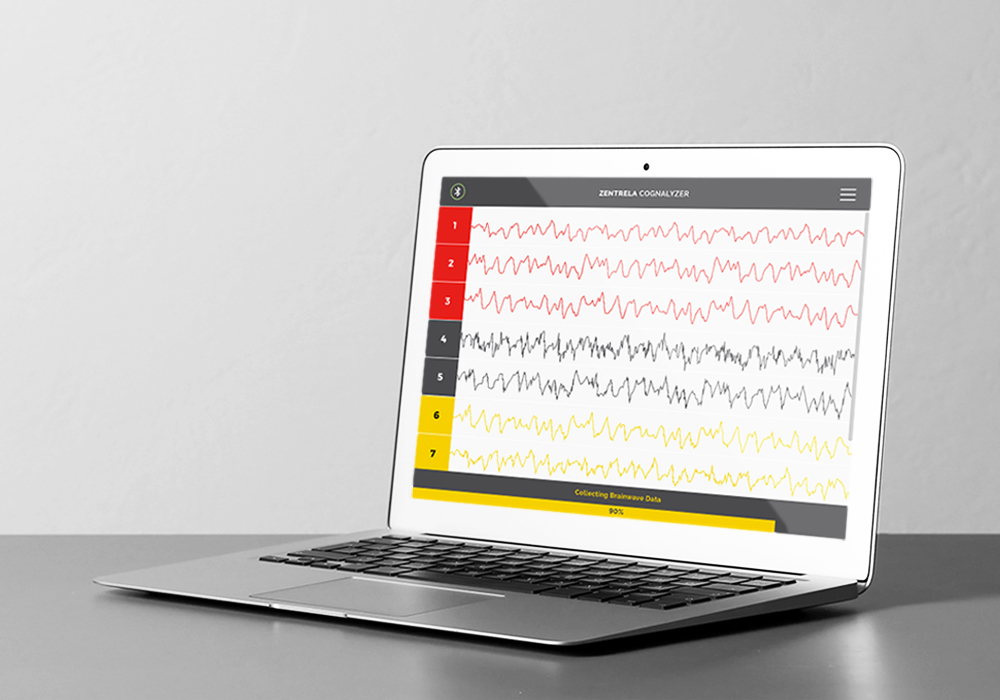
Everybody knows the cliché in cannabis that indicas produce a sedative effect and sativas produce an uplifting high. And everybody realizes that consumers often seek out the highest THC percentages on products when they shop at dispensaries, looking to get the most “bang for their buck.”
But within the cannabis industry, it’s also well-known that true indicas and sativas are rare — most commercial genetics have been cross-bred, hybridized and renamed so many times, they no longer fall into a simple, binary classification — and that THC percentages alone cannot tell the whole story of a specific product.
Zentrela founder and CEO Israel Gasperin believes his company has developed a technology to help consumers cut through the noise and get a better understanding of how a product might affect them.
Zentrela uses brain wave analysis and artificial intelligence to evaluate and quantify the psychoactive effects of cannabis products on different types of consumers, giving licensed producers an entirely new tool to improve product development and to revolutionize their marketing efforts.
“We can scientifically demonstrate that two products with the same amount of THC does not necessarily create the same consumer psychoactive experience,” Gasperin says. “Even the same product creates different psychoactive experiences, depending on the type of consumer — frequent versus infrequent consumers.”

The Pivot to Cannabis
Gasperin, who is originally from Mexico and emigrated to Canada about seven years ago, founded Zentrela on the idea of using neurotechnology to measure and manage driver fatigue. He spent a couple years researching the transportation and insurance industries on everything related to fatigue.
But around 2016, it became apparent that Canada was on a path to legalize recreational cannabis at the federal level and Gasperin began to learn the challenges of drug testing for cannabis. The standard blood, urine, saliva and hair analyses used for detecting the presence of THC only measured the concentration of the substance within one’s body and were not accurate measurements for a person’s level of impairment, which had important consequences with regards to law enforcement and workplace safety concerns.
“At that point, I decided to pivot to cannabis and impairment detection, rather than fatigue detection,” Gasperin says.
In 2018 — the same year Canada passed the Cannabis Act, legalizing marijuana for adult use — Zentrela began developing its first algorithms to identify the complex patterns in brain waves when brain function is altered by consuming cannabis.
While Zentrela was initially funded to help law enforcement with impaired driving, Gasperin didn’t see that as a commercially viable way to utilize the technology the company had developed. He began meeting with Canada’s licensed producers and realized the emerging market need for ways of analyzing the effects different cannabis products have on consumers. In Canada, most products are described by their terpene and cannabinoid profiles, not the effects they have on consumers, because the government prohibits companies from using that type of marketing, unless the effects can be scientifically proven.
With Zentrela’s artificial intelligence-backed algorithms and wearable neurotechnology, “we can objectively and scientifically measure effects of cannabis products,” Gasperin says.
This opens an entirely new realm of possibilities for producers looking to understand their own products, looking to understand their competitors’ products and looking to transform the marketing of their products to connect with the ideal target audience.
Gasperin is careful to point out that Zentrela does not conduct clinical studies, but it provides scientific results at a fraction of the cost and time. Typically, he says, it would cost about $300,000 and take two years to hire a contract research organization to conduct a clinical study on the effects of a single, specific product.
“When you take into consideration that these companies have hundreds of products, and every product can differ in effects or consumer experiences, it is just not sustainable to conduct this type of study,” Gasperin says.
He explained to licensed producers that Zentrela’s consumer experience data, collected objectively and scientifically from the company’s research into consumers’ psychoactive experiences, could be licensed to producers at a fraction of the cost of a clinical study.
“They love it and they said they really want to do it,” Gasperin says.

Utilizing the Data
Gasperin says he expects producers to use the Zentrela data for research and development and marketing.
For R&D purposes, producers want to understand everything they can about consumer psychoactive experiences for different products. Zentrela can provide them information about onset time, intensity and duration of the psychoactive effects for specific consumer types, taking into account whether the individual is a regular, experienced consumer or a lower-tolerance, infrequent consumer.
“The exciting part is we already have objective evidence that two products with the same amount of THC, but a different formulation, can create a completely different experience,” he says. “One creates a faster, stronger psychoactive experience than the other one.”
Products with a faster onset and more intense high are more likely to be enjoyed by experienced consumers, whereas a more mellow product is generally preferred by less frequent consumers — so this information is critical for producers to know, especially when both are tested at the same level of THC.
Producers also want to know the performance of their competitors’ products as a way of benchmarking and conducting a SWOT analysis (strengths, weaknesses, opportunities and threats). This helps them understand ways to differentiate their products, identifies product gaps that might exist and gives them a basis for refining their formulas to better achieve results they’re looking for.
In terms of marketing, Gasperin believes Zentrela will help usher in a new era for cannabis companies and consumers. No longer will producers be forced to rely solely on their branding and packaging or abstract details such as cannabinoid ratios and terpene content. Zentrela’s data will help companies reach their target audience more effectively — and in a regulatory compliant manner, Gasperin says — thus, helping build brand loyalty and trust.
“In 2022, there will be a shift in marketing, now that we can do consumer experience-driven marketing,” he says.
GARRETT RUDOLPH
Marijuana Venture editor-in-chief.
